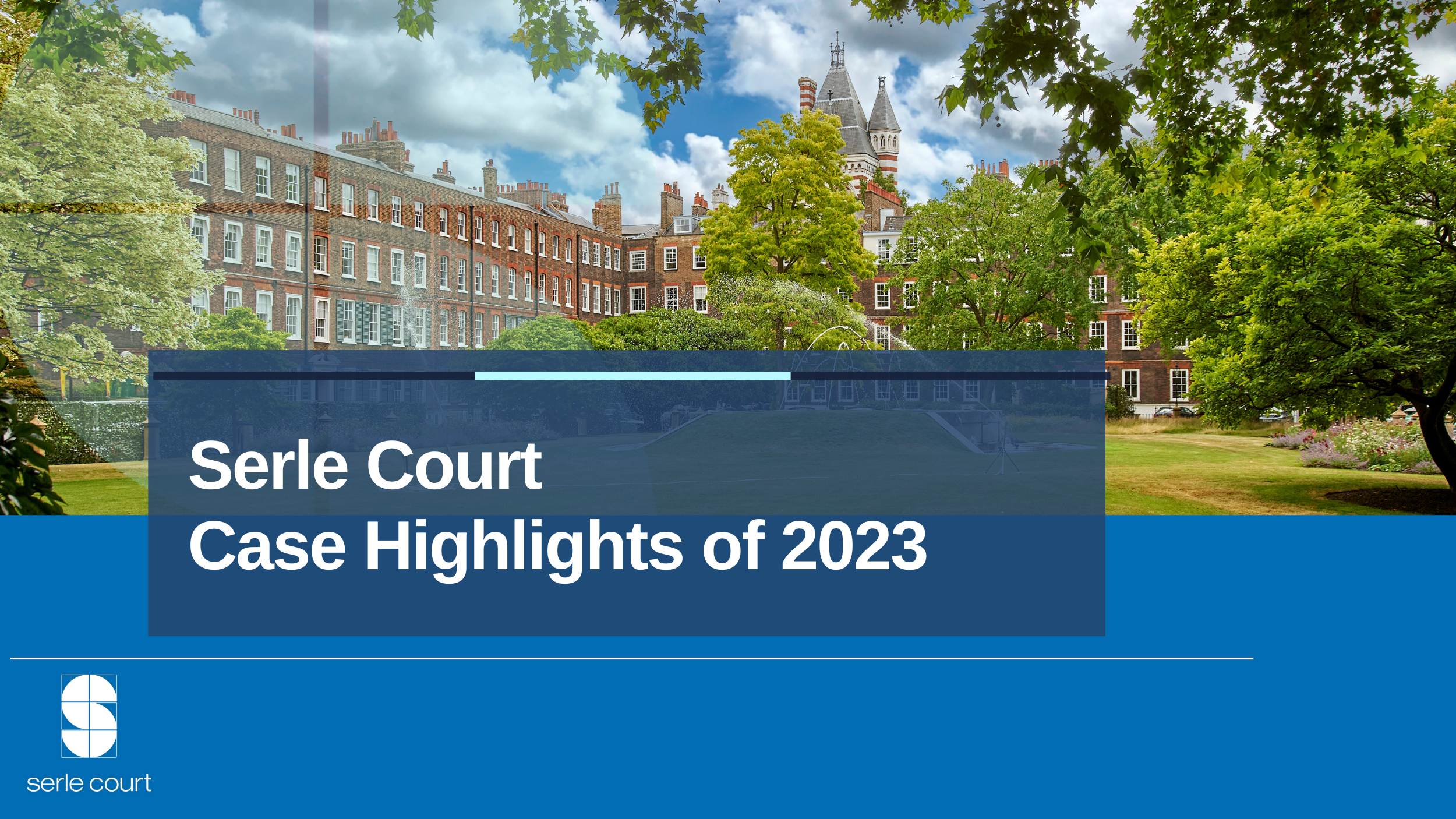Case Highlights of 2023
Grand View Private Trust Co Ltd and another (Respondents) v Wong and others [2022] UKPC 47
On 8 December 2022, the Privy Council handed down judgment allowing the appeals of Dr Winston Wong, Riley Wong and Tony Wang in the conjoined appeals of Grand View Private Trust Co Ltd and another (Respondents) v Wong and others [2022] UKPC 47.
This case raised the issue of whether the removal of all of the members of a family from a Bermudian trust as objects, whilst simultaneously adding the trustee of a purpose trust as an object to the same trust by its trustee, was invalid on the basis that it changed the substratum of the trust or that that the exercise of the power was for an improper purpose.
In one of the most important trusts law judgments in recent years the Board unanimously held that the exercise of a power adding and excluding beneficiaries was void on the basis that it was inconsistent with the purpose for which the power was conferred. The judgment has important implications for the exercise of fiduciary powers more generally.
Of the eleven barristers from English chambers who appeared in the Privy Council, eight were from Serle Court: Dakis Hagen KC, Emma Hargreaves and Stephanie Thompson (instructed by Baker McKenzie (London) and ASW Law Limited (Bermuda)) acted for the appellants in the first appeal; Richard Wilson KC, James Weale and Charlotte Beynon (instructed by Stewarts, MJM Limited (Bermuda) and Baker McKenzie (Taipei)) acted for the appellant in the second appeal; Jonathan Adkin KC and Adil Mohamedbhai acted for the respondent in both appeals (instructed by Skadden Arps Slate Meagher & Flom (London) and Conyers Dill & Pearman (Bermuda)).
Dyer v Webb [2023] EWHC 1917 (KB)
Amy Proferes acted for the successful respondents. This judgment confirms that objecting to planning applications, and discussing those applications with others, are rights protected under the Human Rights Act 1998.
The case (as noted by Dexter Dias KC in his judgment) “raises important questions about the nature, extent and limitations of certain of our fundamental freedoms under the law.”
The Applicants sought an injunction to restrain the Respondents from (amongst other things) acting in concert, coercing or soliciting others to make ‘unmeritorious’ objections to the Applicants’ planning applications.
In applications for injunctions which will restrict freedom of expression the burden is on the applicant to show that they are more likely than not to succeed at trial (following s12(3) of the Human Rights Act 1998).
The Applicants failed to meet this burden, as well as that set out in American Cyanamid. On both the test to restrain the Respondents’ rights of expression, assembly, and association, and to restrain other alleged conduct, the Applicants failed on each of the three limbs of the relevant test. They also failed to meet the test for a pre-action injunction at CPR 52.2(2)(b).
The court ordered the Applicants to pay the Respondents’ costs on the indemnity basis, and recorded that the application was considered to be Totally Without Merit. It can only be hoped that this resounding judgment will restore peace to what the judge described as “a truly beautiful part of the country.”
The Executor of HRH the Prince Philip Duke of Edinburgh v HM Attorney General and Guardian News and Media
A notable example of our expertise is reflected by our involvement in a case concerning the will of HRH Prince Philip, Duke of Edinburgh, in which William Henderson acted successfully for the Attorney General. In work undertaken by chambers over the past year, there is an increasing multi-jurisdictional trend which requires constant innovative thought.
In the long-running dispute concerning the estate of the renowned architect, Dame Zaha, Chief Master Marsh referred to the fact that there were more than 20 meetings between solicitors, and also a mediation in the run-up to the hearing. Serle Court members were intrinsically involved in the settlement of this dispute. In the substantive proceedings, Richard Wilson KC, Giles Richardson KC, Amy Proferes and Jamie Randall all appeared for the Claimant, Patrik Schumacher, and James Brightwell (now Master Brightwell) and Max Marenbon of Serle Court (led by Elspeth Talbot-Rice KC) for the First to Third Defendants. Beverly-Ann Rogers (Serle Court) was the Mediator.
The case demonstrates Serle Court’s characteristic ability to act in protracted, technically difficult disputes, where there are often several trustee parties with varying interests to consider, while also ensuring that if matters are capable of settlement this is pursued in the clients’ best interests, and that alternative dispute resolution methods are considered. Our barristers are consistently praised for their bespoke client service and support, and in identifying the best possible solution for each client.
DnaNudge Limited v Ventura Capital GP Limited [2023] EWCA Civ 1142.
Tim Collingwood KC acted for the successful respondent. The Court of Appeal dismissed the appeal of DnaNudge and upheld the decision at first instance that the purported conversion of preferred shares to ordinary shares constituted an abrogation of class rights which required class consent under the articles of association (on their proper construction).
The case is likely to be of interest to litigators and corporate lawyers alike, providing as it does a useful insight into the court’s approach to the construction of articles of association, the variation of class rights and the concept of the conversion of shares.
Prescott Place Freeholders Limited v Batin & Donovan [2023] EWHC 1445 (Ch)
Michael Walsh acted for the successful claimants. The Court agreed with the Claimants’ submissions that order under section 19 of the Landlord and Tenant Act 1987 is an interest in land. This is the first time the High Court has had to decide this point and it is an important decision for tenants who are enforcing their rights of first refusal under the 1987 Act against a recalcitrant landlord.
The effect of the Court’s decision was that the proprietary right created by the section 19 order (which was protected on the register by a notice) had priority over the equitable leases that were granted by D1 to D2, about which they had both lied at trial, claiming they were granted in 2014, when in fact they were granted in 2019, after the section 19 order was made.
The equitable interest created by the section 19 order also gave the Claimants standing to claim injunctions restraining D2 from registering notices to protect equitable leases and further injunctions preventing him from going into actual occupation prior to C1 (the nominated purchaser) being registered as proprietor, and thereby claiming that he had an overriding interest as a person in actual occupation.
The Court found there was no statutory restriction in the 1987 Act preventing new interests being granted out of the freehold after a section 19 order is made. D2 tried to rely on this point in resisting the injunctions but the Court dismissed this argument at paragraph 70.
D2 also complained that the effect of restraining him from registering his leases was to give the Claimants a windfall because they would obtain two unencumbered flats worth approximately £1.5 million for the consideration paid by D1 of £125,000 on the relevant disposal (which was a huge undervalue). The Court found that “Even if this can be referred to colloquially as a “windfall”, it is nothing more than the result for which Parliament has legislated.”
Ivanishvili v Credit Suisse Limited [2023] SGCH(I) 9
Sophie Holcombe and Jamie Randall acted for the successful plaintiffs. The Singapore International Commercial Court (International Judge Bergin) handed down judgment following the trial of the dispute between Bidzina Ivanishvili and other plaintiffs and Credit Suisse Trust Limited. The claim stemmed from the long-running fraud committed by Patrice Lescaudron, an employee of Credit Suisse Bank in Geneva.
In a detailed judgment spanning 257 pages, the Court upheld the plaintiffs’ claim that the defendant acted in breach of trust.
The Court has determined the basis for the assessment of loss and ordered that the calculations of loss be updated following the judgment. The total loss is expected to be in excess of USD 900 million.
Healey v Fraine and others [2023] EWCA Civ 549
Michael Walsh acted for the successful respondent. The Court of Appeal decided that Parliament did not intend to change the law of adverse possession in the Land Registration Act 2002 so that occupiers of land could be in possession with the consent of the owner and also be in adverse possession at the same time for the purposes of paragraph 5 of schedule 6 of the Act. The Court decided that the meaning of adverse possession had not changed.
The judgment is a wide-ranging review of the authorities relating to the legal principles of adverse possession in unregistered and registered land.
Hunt v Ubhi [2023] EWCA Civ 417
John Machell KC and Dan McCourt Fritz KC (in his last appearance as a junior) acted for the successful appellant. The Court of Appeal reiterated that the default rule is that applicants for freezing orders, including office holders, must provide unlimited cross undertakings in damages and that a departure from the default rule must be justified. The decision also flags, but does not resolve, some niche issues relating to the Insolvent Partnerships Order.
Floreat Investment Management v Churchill and others [2023] EWCA Civ 440
Thomas Elias and John Eldridge acted for the successful appellants. The Court of Appeal reversed a finding of dishonesty made at first instance and entered judgment in favour of the appellants. The decision also provides useful guidance as to the appropriate content and structure of trial closing submissions.





















